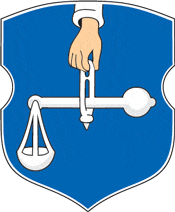Shklow
Shklow (Belarusian: Шклоў, [ʂkɫɔu̯]; Škłoŭ; Russian: Шклов, Shklov; Yiddish: שקלאָוו, Shklov, Polish: Szkłów) is a town in Mogilev Region, Belarus, located 35 kilometres (22 mi) north of Mogilev on the Dnieper river. It has a railway station on the line between Orsha and Mogilev. As of 2009, its population was 16,439.[1]


History
- 1535: First records about the town.
- 1654, 1656: Two battles, see battles of Shkloŭ
- April 10, 1762: Coat of arms.
Shklov was an important Jewish religious center. There was a yeshiva there in the 18th century. Shklov became the center of the Haskalah movement.[2] At the end of the 19th century, there were 5542 Jews in the town. Jews traded for a living. A dozen families worked in the Jewish kolkhoz Iskra. In 1939, only 2132 Jews remained in Shklov. The Germans occupied the town on July 12, 1941.[3]
The first execution of Jews took place just a few days into the occupation. The Germans shot 25 Jewish men in Lenin Park. At the end of July 1941, two ghettos were established in the neighboring village of Ryzhkovichi. In August 1941, the Einsatzgruppen arrived in the town and gathered 84 Jews under the pretext of sending them to forced labor. In fact, they were taken to the village of Semyonovka and were shot in the kolkhoz. In September 1941, the Jews were taken to a ravine in Khoduly, between the villages of Putniki and Zarechye. They had to undress and lie in the ditch before being shot. According to Soviet sources, 3200 Jews were killed in Shklov and neighborhood.[4]
Alexander Lukashenko, President of Belarus since 1994, held a position as the director of the construction materials plant in Shklov Raion before he became a collective farm manager and then moved into politics.[5]
Transport
- 1 railway station
- 3 bus routes
People
The Jewish family name Shklovsky or Shklover indicates that the person or their ancestors come from Shkloŭ.
- Semyon Zorich, Serbian-born Russian General who founded an estate in Shkloŭ (Shklov).
- Yitzhak Salkinsohn, born in Shklov
- Joshua Zeitlin, rabbinical scholar and philanthropist, born here
- Yehoshua Leib Diskin, rabbi in Shklov
- Rogatchover Gaon, studied in Shklov under Yehoshua Leib
- Pavel Axelrod (1850–1928), Russian Menshevik revolutionary
- Zalman Shneur (1887–1959), Hebrew and Yiddish poet
- Baruch Schick of Shklov (1744–1808) rabbi and scholar, Hebrew author and translator[6]
- Josef Gusikov, klezmer musician, born in Shklov
- Naum Eitingon, general of the NKVD and murderer of Leon Trotsky, born in Shklov
- Yisroel ben Shmuel of Shklov, Rabbi, disciple of the Vilna Gaon
- Menchem Mendel of Shklov, Rabbi, disciple of the Vilna Gaon, leader of Perushim migration to the Holy Land in 1808
- Rabbi Moshe Feinstein, studied and lived in Shklov before emigrating to the United States to become the preeminent Torah sage and posek of his generation[7]
See also
References
- Численность населения областей и районов: Могилевская (PDF) (in Russian). Национальный статистический комитет Республики Беларусь. Archived from the original (PDF) on September 18, 2010. Retrieved January 30, 2012.
- "SHKLOV". Jewish Encyclopedia. Retrieved September 26, 2017.
- "Archived copy". Archived from the original on February 24, 2016. Retrieved February 28, 2016.CS1 maint: archived copy as title (link)
- "Execution of Jews in Shklov". Execution Site of Jewish Victims. Retrieved September 26, 2017.
- Profile: Alexander Lukashenko – BBC News, 9 January 2007. Retrieved 10 August 2007. Archived December 20, 2006, at the Wayback Machine
- The Haskalah Movement In Russia – Project Gutenberg. Retrieved 9 August 2007.
- Finkelman, Shimon, author. Reb Moshe : the life and ideals of haGaon Rabbi Moshe Feinstein. ISBN 1-4226-1084-5. OCLC 805391556.CS1 maint: multiple names: authors list (link)
External links
| Wikimedia Commons has media related to Škloŭ. |
